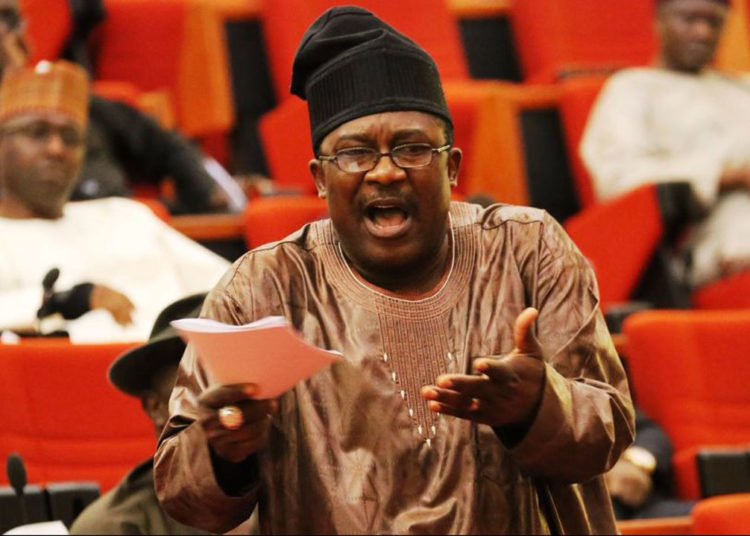A former Senator who represented Kogi West in the 9th National Assembly, Smart Adeyemi, has rejected the advice of the Supreme Court to withdraw his petition against the conduct and outcome of the governorship primary election of Kogi State chapter of the All Progressives Congress (APC).
The apex court on Thursday hinted that Adeyemi’s appeal against the judgements of the two lower courts on the primary election, which held in Kogi State on April 15, 2023, was incompetent.
Adeyemi had filed a suit at the Federal High Court seeking to nullify the primary election of the APC, which produced Usman Ododo as the party’s flagbearer for the state’s governorship election slated for November 11. However, the case was dismissed by both the Federal High Court and the Court of Appeal for lacking in merit.
The apex court, while hearing his appeal on Thursday told the former lawmaker’s lawyer, Musibau Adetumbi, SAN, that the litigant was appealing against concurrent findings of the Federal High Court and the Court of Appeal, which held that the APC primary election was held in Kogi State but that he had failed to challenge the concurrent findings or demonstrate that same was perverse.
The apex court panel, which was presided over by Justice Inyang Okoro, stated that by just looking at the brief, Adeyemi’s appeal was “dead on arrival”, and hinted his Counsel on the need to withdraw the appeal.
Adeyemi’s counsel, however, said he would go ahead to argue the appeal. The appeal was accordingly heard.
Counsel to Ododo, F. O. Ekpa, who was led by M. Y. Abdullahi, SAN, while adopting his brief of argument, informed the court that Adeyemi’s appeal was academic, considering that the relief sought by him was that fresh primaries be conducted. Counsel argued that the time within which to conduct the primary election as stipulated by the Electoral Act 2022 had expired, hence the court could no longer grant Adeyemi’s prayer.
Having heard the arguments of the Counsel, the Supreme Court, therefore, adjourned the appeal to October 23, 2023 for judgment.
Chief Anthony Adeniyi, SAN, represented the Independent National Electoral Commission (INEC), Abdulwahab Mohammed, SAN, represented the APC, while M.Y. Abdullahi, SAN represented the APC governorship candidate, Usman Ododo.
The Court of Appeal had on August 18, 2023, held that the appeal argued by Adekunle Oladapo Otitoju on behalf of Senator Adeyemi was completely bereft of merit.
In a unanimous judgment of a 3-man panel of Justices of the Court, Adeyemi was said to have failed woefully to establish all grievous criminal allegations made against the conduct of the primary election by APC and its leaders.
Justice Mohammed Lawal Shuaib, who delivered the lead judgment, resolved all three issues in dispute against Adeyemi.
Justice Shuaib said that the allegations of manipulations and falsifications of the primary election results made by Adeyemi, being criminal in nature, ought to have been proved beyond reasonable doubt as required by law.
He also dismissed another allegation by the Appellant that he was denied fair hearing by the Appeal Committee of the APC based on his petition against the alleged unlawful conduct of the primary election.
Justice Shuaib said that the issue of denial of fair hearing was not raised in his originating summons at the Federal High Court, hence, could not be raised as a fresh issue at the Court of Appeal.
In the absence of cogent and verifiable evidence on the part of Adeyemi, the Court of Appeal held that his allegations remained mere assertions that could not enjoy any probative value.
The Court of Appeal upheld the judgment of Justice James Omotosho of the Federal High Court in Abuja delivered on July 12, which had held that Adeyemi did not prove his allegations that Ododo was not lawfully nominated by the APC.
Senator Adeyemi had, therefore, sought an order of the Supreme Court, setting aside the judgments of the lower courts, allowing his appeal and granting all the reliefs sought in his originating summons.
“Since their Lordships made a categorical finding of facts that the Appellant’s case, simpliciter, is that the primary election in issue was not conducted in accordance with the law, the duty to prove the contrary lies with the Respondents who asserted positively that the said primary election was conducted in accordance with the law.
“With profound humility to our noble Lords of the Honourable Court below, their Lordships misapprehended where lies the burden of proof in the case at hand. Hence their Lordships came to a wrong conclusion in law and equity,” he argued.
We’ve got the edge. Get real-time reports, breaking scoops, and exclusive angles delivered straight to your phone. Don’t settle for stale news. Join LEADERSHIP NEWS on WhatsApp for 24/7 updates →
Join Our WhatsApp Channel










